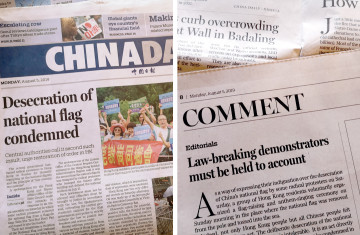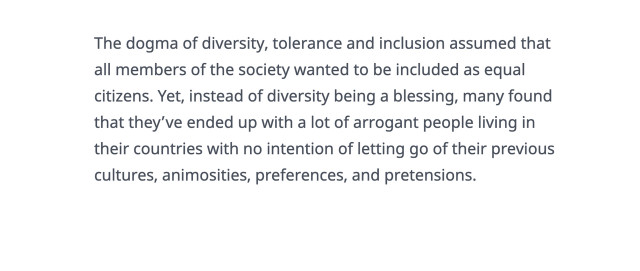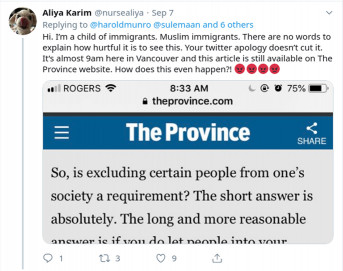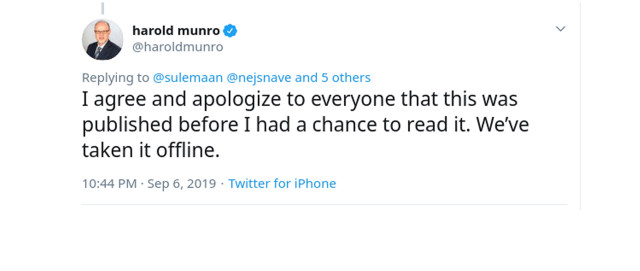The Chinese media prepared me for the Canadian election
Barry Rueger’s trip to China showed him what happens when the state media controls the news stories its population reads. He just didn’t expect to find a somewhat similar thing happening in Canada when he got back.

In China, most people see and read only what the Communist party wants them to see and read.
Donald Trump’s trade war with China was in full swing when we left for China. Huawei CFO Meng Wanzhou had been arrested at a Canadian airport, and two Canadians had been detained in China. By the time we left it was July and the Canadian government was warning us to “Exercise a high degree of caution in China due to the risk of arbitrary enforcement of local laws.”
The trip was wonderful, and we came away with a much greater understanding of China and the Chinese people, and with an appreciation for how little we knew about the history, culture and government of the country.
The most striking thing about living in what is undeniably a police state was the iron grip that government has on the news media. Since the average person in China isn’t likely to use a VPN to access foreign media, most people see and read only what the Communist party wants them to see and read.
Our morning breakfasts in the Shangri-la Hotel invariably included that day’s copy of the English-language China Daily. The newspaper is described by Wikipedia as “an English-language daily newspaper owned by the Publicity Department of the Communist Party of China and published in the People's Republic of China.” The paper is filled with upbeat and inspirational human interest stories that we usually skipped in favour of the front page’s coverage of national and world news.
- Why independent journalism is critical in isolated communities
- Where’s local news in the Facebook age?
- A sleepless year in a sleepy town
The Hong Kong protesters that most Western media would describe as “fighting for democracy” were called “rioters,” under the direct influence of the United States, and responsible for injuries and looting. Every day we read stories about “ordinary” Hong Kong people who were angry and frustrated, and who described how these troublemakers were disrupting their lives.
Chinese trade practices were reported as being perfectly reasonable in the face of an out-of-control American president’s attacks, and stories related how Chinese industry was working extra hard to keep the country strong while the battle happened. In particular, every issue had stories about one or two major infrastructure projects that were transforming people’s lives for the better.
The China Central Television (CCTV) channels all seemed to present a steady diet of war movies and other heroic material, and news programs had a nationalistic slant that reminded me of the good old days of Radio Free Moscow. The big surprise on the hotel TV was finding that CNN and BBC News channels were both available – until the BBC screen went black for 90 seconds when a story about Hong Kong was aired.
I was shocked to realize that the Canadian news landscape was far too much like the Chinese one we had just left behind. The only difference was that the control was by corporate interests instead of the government.
When we returned home, I was truly looking forward to returning to my regular media diet of Twitter, Facebook and our local newspapers. Instead, I was shocked to realize that the Canadian news landscape was far too much like the Chinese one we had just left behind. The only difference was that the control was by corporate interests instead of the government.
Just days before we arrived back in Vancouver, the Canadaland.com website published a lengthy story about a Postmedia edict to all of its newspapers directing them to swing their publications significantly to the right. Or, as some described it, to the Alt-Right.
The story by reporter Sean Craig described how, during an October 2018 meeting, “Several editors at the National Post — Postmedia’s flagship newspaper — were summoned to a meeting on the 12th floor of the company’s headquarters [where] company president Andrew MacLeod told them that their paper was insufficiently conservative.”
Postmedia owns a significant share of Canada’s newspapers, including 25 major dailies, some 35 smaller community newspapers and free commuter papers in Vancouver and Toronto. Since the Manhattan-based hedge fund Golden Tree Asset Management acquired the bankrupt CanWest media in 2010, Postmedia has closed or downsized newspapers, and has explicitly ordered papers to endorse Conservative candidates in federal elections.
The move from “right-wing’ to “Alt-right” was on display recently when the Vancouver Sun and Province published an opinion piece by Mark Hecht, a geography instructor at Calgary’s Mount Royal University. The column, which complained of “the dogma of diversity, tolerance, and inclusion” and praised “the virtues of homogeneity and exclusion,” was immediately branded as “white-nationalist” by The Tyee.
Almost as soon as the Twitter journalism community called it out, the article was removed from the Sun website. It was subsequently also removed from the Province’s site, but not before being embraced and circulated widely by right-wing ideologues and neo-Nazis.
Soon afterwards, the Sun’s editor-in-chief Harold Munro tweeted an apology, explaining that he didn’t know how it got published in “his” paper. Neither the Sun nor Postmedia has explained exactly how the column was approved for publication, or who was responsible for it, but it’s hard to avoid the feeling that it wasn’t just an accident. A subsequent printed apology offers no explanation.
As we experience a particularly nasty election campaign, one which is already overflowing with disinformation and “fake news,” I’m reminded of one more thing that I learned in China.
While enjoying endless meals of Sichuan cuisine, we did question our hosts about subjects like the subjugation of the Muslim Uyghur population, Tibet and Taiwan, and of course the protests in Hong Kong.
What we found was that even though they were educated people who used VPN services to access BBC and North American news from behind the Great Firewall of China, when discussing internal Chinese subjects they defaulted to what they were told by the local government-run media.
The power of the Chinese Communist Party didn’t just rest on control of the media, it was successful because all things being equal, people will choose to assume that their local news media are more trustworthy than those from another country.
That is as true in Canada as it is in China. What is published in a local or national newspaper, subsequently repeated on the television and radio newscasts, and passed around on Facebook or Twitter, is still assumed to be true because we “know” our local media and trust them.
Any Canadian who really cares about this election will have great difficulty finding the real facts that will let them choose which candidate or party to vote for.
Any Canadian who really cares about this election will have great difficulty finding the real facts that will let them choose which candidate or party to vote for. Election advertising and social media are a sea of spin, half-truths and outright lies. Candidate speeches (and platforms) are long on patriotism and short on details.
If Canada’s corporate media leans so heavily towards the right that it can’t be trusted to give me unbiased coverage – and that certainly seems to be the case – then my one last hope for trustworthy election coverage lies with our Canadian Broadcasting Corporation. Whatever its faults, and they are legion, I tend to trust that the CBC will try to offer balanced, non-partisan reporting.
I hope that, given our current media climate, there will be other Canadians who also want to escape the hate-filled attack ads and partisan spin to hear about real issues, where our candidates stand on them, and most importantly when we are being lied to. Hopefully they’ll also appreciate that we’re fortunate to have a public broadcaster that is still mostly free of government influence — something that China also needs.
I believe that the CBC still plays a critical role in protecting the rights and social programs that we all enjoy. If Canadians elect a Conservative Scheer government it’s possible that we’ll lose that safeguard, and will be left with nothing but Postmedia, Rogers, and Bell to protect us from the worst of modern governments.
As we saw in China, it is never enough to hear only one voice.



